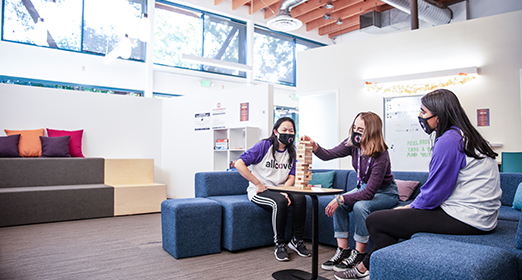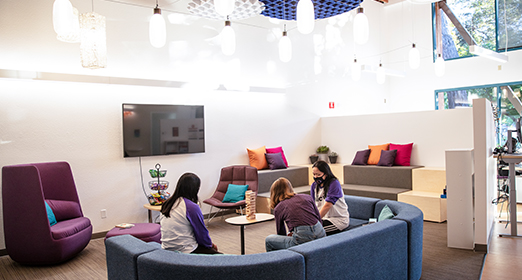Step into the new allcove centers in San Jose and Palo Alto and discover mental health care for young people, reimagined.
There are colorful, comfortable chairs and couches. Open, airy spaces. As you enter the center, a friendly peer support staff member greets you. Sign in and choose from a range of services tailored for youth ages 12 to 25. These go beyond mental health counseling to include physical/sexual health advice and treatment, peer and family support, education support and career coaching, and substance use treatment support. There’s also room to simply chat with peers, relax, catch up on homework, or have a lively game of Uno or Jenga.
Developed by the Stanford Center for Youth Mental Health and Wellbeing in partnership with local and state government and community groups, allcove offers a safe place where youth and young adults can find community, support, advice, and a moment of pause before turning to face the challenges of their daily lives again.
“It’s very important that we create these spaces for young people to get the care and support they need before things move to a crisis point,” says Steven Adelsheim, MD, director of the Center for Youth Mental Health and Wellbeing. “We don’t often have spaces where young people can explore issues like stress with a friend, or bullying, or worry about a test, or sexual orientation questions. That’s what we’re trying to create. We want allcove to be a model for state- and nation-wide mental health support for young people.”
Adelsheim championed the allcove model after learning about a program in Australia called headspace, which has over 130 centers. Like headspace, allcove is community-based with a focus on equity and youth input. Centers offer a wide variety of services that youth and young adults need, on a walk-in basis or by appointment, and at no cost or for a low fee regardless of health insurance status. The goal is to support and empower young people to meet mental health challenges before they become more serious—or reach a crisis point.
The first two allcove centers opened in June 2021, with seven more in the planning stages in San Mateo, Los Angeles, Sacramento, and Orange counties and other California locations. Meanwhile, communities across the country have reached out to find out more about allcove, Adelsheim notes.
For youth, by youth
allcove's powerful approach comes directly from the people it serves: youth. Youth Advisory Groups (YAGs) design each allcove center's environments and processes, creating an atmosphere that meets each person's and each community's needs, explains Ana Lilia Soto, youth development manager for the Center for Youth Mental Health and Wellbeing.
“The Youth Advisory Groups were involved, through a shared decision-making model, in choosing the locations for the first two centers so they would be easy for young people to reach. They created the identity and name for the program—allcove, meaning a place where everyone can come and find a moment of pause,” Soto says.
Each YAG is a racially, culturally, and socioeconomically diverse group of 16-to-25-year-olds from that center's local community.
“The YAG members stay involved,” Soto says. "If they hear that other services are needed, like connections to food banks if there's food insecurity, they make that a priority.”
Overcoming the stigma of asking for mental health help and making it available to more youth are important goals, says YAG member Emily Wang, 17, a high school senior from San Jose.
“We're trying to understand and implement what youth will need and like, and what will make people feel safe and comfortable,” Wang says. "We want a young person to know that yes, this is where you can be you and have your needs met. Everyone is working together to uplift each other's mental health and their own, whether the need seems large or small.”
allcove's approach could help overcome barriers that deter youth and young adults from accessing more traditional mental health care, says Toby Ewing, executive director of California's Mental Health Services Oversight and Accountability Commission.
“To get out in front of the mental health crisis that young people are facing, we need to embrace their strengths and perspectives and support them in healthy ways," Ewing says. "This is among the most ambitious efforts in California to design services through the lens of the clients: our young people.”
The Commission allocated $15 million in mental Health Services Act innovation funds for allcove San Jose and allcove Palo Alto. In addition to the Sand Hill Foundation, other donors—including the California Health Care Foundation, David and Lucile Packard Foundation, the Greathouse Family Foundation, Hearst Foundation, and McKenzie Foundation—have given their support to this bold new approach.
To learn more about allcove, visit allcove.org. To support allcove in reaching more young people, contact Rachel Olinger at (650) 497-8166 or Rachel.Olinger@LPFCH.org, or give now at supportLPCH.org/Donate.
This article originally appeared in the Fall 2021 issue of Packard Children’s News.



